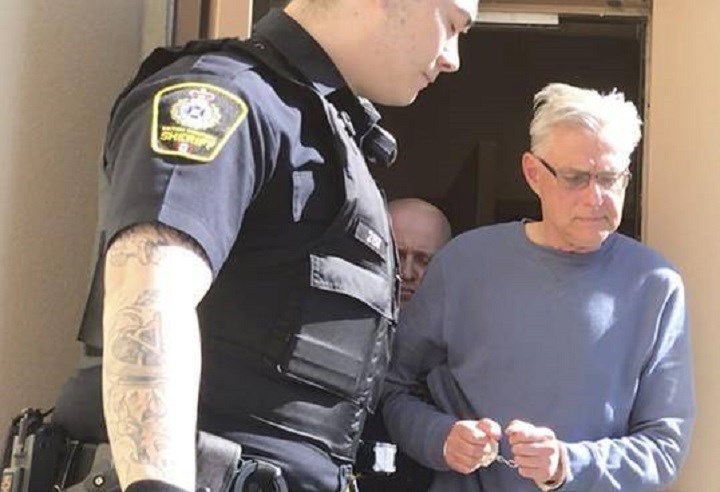Quadruple murderer John Brittain has been sentenced to life in prison with no chance of parole for 25 years.
Justice Alison Beames ruled that the four statutory life sentences and periods of parole ineligibility be served concurrently, making Brittain eligible for parole when he is 92-years-old.
Crown prosecutors attempted to argue for a 40-year period of parole ineligibility by having Brittain sentenced for the second-degree murder count consecutive to the three first-degree charges, but Beames rejected the four-decades as “unduly long and harsh.”
She ruled the 25-year period meets the objective of sentencing.
The court heard earlier during the sentencing hearing that those convicted of multiple counts of murder are rarely granted parole anyways and, with Brittain's age, a 40-year period would have been "largely symbolic."
Brittain previously told the court he understands he will likely die in prison.
Beames accepted that Brittain is deeply remorseful for the murders, saying the fact that such “horrific, senseless and incomprehensible” killings happened as a result of “petty neighbourhood grievances” is “almost unimaginable.”
ORIGINAL STORY:
John Brittain said his cold-blooded killing spree on the morning of April 15, 2019 was the result of 20 years of workplace burnout and major depression that finally led to a “mental breakdown.”
At the conclusion of the second-day of Brittain's sentencing hearing Thursday, Brittain spoke for several minutes, apologizing to the families of the people he killed, the emergency services personnel who responded to the horrific scenes, the wider Penticton community and his ex-wife Katherine Brittain.
Brittain pleaded guilty to three counts of first-degree murder and one count of second-degree murder Wednesday morning. During the Crown’s sentencing submissions Wednesday, the court heard how Brittain “snapped” on the morning of April 15, 2019, fatally shooting Rudy Winter several times on the lawn across the street from Brittain's home, before driving across town and murdering Barry and Susan Wonch in their garage, and Darlene Knippelberg at her front door in cold blood.
“I had no idea, nor did anyone else, that Monday, April 15 would turn into a horrific day for three families, myself, Kathy and the citizens of Penticton,” Brittain said. “I reacted to threats and images that were in fact, not real.
“I have no understanding of what caused me to suddenly lose all restraint and perspective which resulted in their untimely and tragic deaths ... Darlene, Barry and Sue and Rudy deserved to live out their natural lives and to have passed away surrounded by their family and friends. I deprived them of that and I'm truly, truly sorry.”
Brittain paused several times, fighting back tears, as he read his statement, while the family members of the victims seated in the courtroom gallery audibly sobbed.
“This is to you that had to walk in on these scenes and see this, I am truly sorry,” Brittain said, addressing first responders, some who've been unable to return to work since the horrible spring day 18 months ago. “I see these images in my head, and they will torment me for the rest of my life.”
On Wednesday, a victim's family member confronted Brittain in court, accusing his ex-wife Katherine of putting him up to the killings, but Brittain repeatedly emphasized in his statement that she had no knowledge that he would, or could, commit the murders.
Brittain's defence counsel Paul McMurray attempted to provide some background to his client’s horrific actions. Brittain had lived a law-abiding life for 67 years, working as an engineer across Canada and in poor communities in West Africa.
McMurray said Brittain had been dealing with depressive episodes for many years, describing him as “a bit of a loner.”
“He has not had close personal relationships in his life,” McMurray said. “In the spring of 2019, Mr. Brittain was still experiencing a lot of inner conflict, he was still experiencing major depression ... he was involved in a relationship that was conflicted and he was concerned about the effect of Kathy Brittain's relationship with her neighbours on her.
“Being the type of person who fixes things, he was driven in that depressed state to do what he did.”
Brittain had been attending counselling for the year leading up to the horrific killings, to help sort out his complicated relationship with his ex-wife Katherine Brittain, who he had separated with back in 2012. They still saw each other almost daily though.
Wednesday, Crown prosecutor Colin Forsyth described Brittain's actions as “execution-style killings” and sought the mandatory life sentence with 40 years of parole ineligibility, which would see the sentence for the Winter murder be served consecutively with the other three murders. Canadian law was changed in 2011 to allow for multiple murder sentences to be served consecutively, but last year's sentencing of Jacob Forman in Kelowna is the only instance in B.C. where parole ineligibility of more than 25 years was given to a convicted murderer.
John Brittain’s defence counsel spent Thursday morning arguing Brittain should be allowed to apply for parole in 25 years rather than the Crown’s desired 40 years. But in either case, the 69-year-old man who killed the four Penticton seniors in cold blood is unlikely to ever step outside of a prison again.
Defence counsel Paul McMurray said Thursday morning that even if Brittain is handed the minimum 25 years parole ineligibility, at 92 year's old, he's “unlikely to be alive” and even if he is, “very few” people convicted of multiple murders are ever granted parole.
Justice Alison Beames said a 40-year period of parole ineligibility, which would make Brittain 107 years old when he becomes eligible, would be largely “symbolic” rather than practical.



